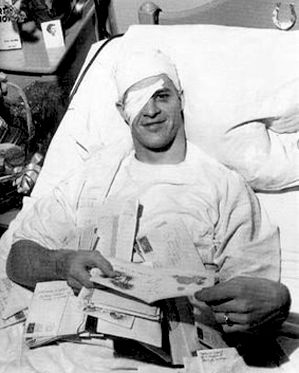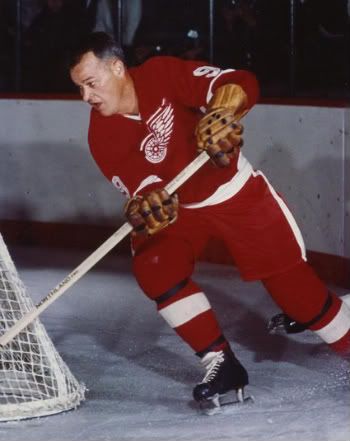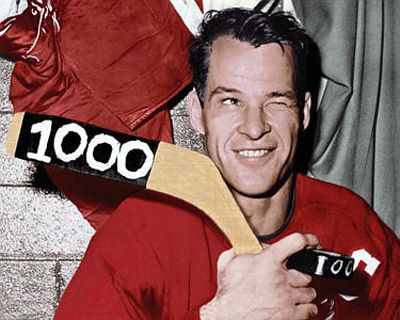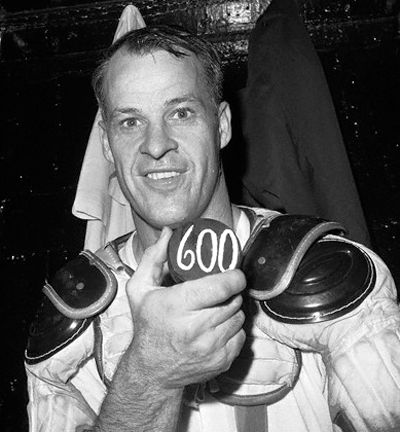Gordie Howe
made his NHL debut in 1946 wearing #17 and then changed to his iconic #9 at the start of the following season for the purpose of having a more preferable sleeping berth on the train while the team was traveling, as the accommodations were more spacious in the lower berths and were allocated based the players sweater numbers.
One of the most dominate players in NHL history, Howe would finish in the top five in league scoring for twenty straight seasons.
Teamed with linemates Sid Abel and Ted Lindsay, "The Production Line" would dominate the NHL and lead Detroit to first place in the regular season standings for each of the four seasons they played together from 1948-49 to 1951-52, a span that would include a pair Stanley Cup Championships in 1950 and 1952. So dominant was the line that they finished first, second and third in league scoring in 1949-50, led by Lindsay's 78 points in 69 games.
Howe would not be around to lift the Stanley Cup in 1950, having suffered a fractured skull earlier in the playoffs, which required emergency surgery to relieve the pressure.
Howe would return to form the following season of 1950-51, scoring 86 points to win the scoring title by 20 points over his nearest competition, the first of seven times he would win the Art Ross Trophy.
Howe would continue throughout the 1950's to accumulate championships and awards, winning the Stanley Cup in 1950, 1952, 1954 and 1955, the Art Ross Trophy as scoring champion from 1951-1954 and 1957, and the Hart Memorial Trophy as the league MVP in 1952, 1953, 1957, 1958 and 1960.
In 1960 Howe registered an assist in a 2-0 win over the Toronto Maple Leafs to score his 1,000th NHL point, the first player in the 44 year history of the league to reach that milestone and he did it in his 938th game. It would be another eight years before Jean Beliveau would become the second and another 20 years before Howe would score his final point! Remember, Howe already had 14 years in the league behind him at this point.
1963 would see Howe capture both the Art Ross and Hart Trophies once more and in 1965 he would score his 600th NHL goal in a game versus the Montreal Canadiens, becoming the first player in NHL history to record 600 goals. It would be until 1972 until Bobby Hull would become the second to 600.
In 1968-69, aided by the recent NHL expansion to 12 teams, which created a longer schedule of games and some admittedly weaker opponents, Howe achieved his one and only 100 point NHL season with 44 goals and 58 assists for 103 points. Included in his 44 goals would be his 700th NHL goal on December 9th, 1968 against the Pittsburgh Penguins Les Binkley. At the time no other player had even reached 550.
After two final seasons with Detroit, Howe retired following the 1970-71 season thanks to a problematic wrist as the league's all-time leading scorer with 786 career goals.
While Howe was away from the game for two seasons, the world of hockey was turned upside down with the arrival of the World Hockey Association, which saw underage players being drafted and salaries escalating beyond any foreseen amounts as the upstart league sought to stock it's roster with established and potential star players.
Two of those potential stars were Mark and Marty Howe, who were just 18 and 19 years old at the time. With those contracts in hand, the Aeros lured he now 45-year-old Gordie out of retirement, after he had already been inducted into the Hockey Hall of Fame!
With his wrist having been operated on, Gordie was back on the ice, unable to pass on the opportunity to play with his sons. His 1,687 games of experience were greater than the rest of the entire Aeros roster combined!
His game in Houston was a model of consistency, as he picked right up where he left off with 31 goals, including the 800th of his professional career. Additionally, his 100 points in 1973-74 were good for third overall in WHA scoring as Houston captured the Avco World Trophy as WHA champions.
The following season Howe topped that with 34 goals on the Aeros way to a second consecutive championship. After another 32 goals in 1975-76, Howe once more reached a milestone never before achieved by a professional hockey player when he scored his 900th career regular season goal on this date in 1977 against the Phoenix Roadrunners in a 8-3 Aeros triumph. Fittingly, his son Marty earned an assist on the landmark goal.
Howe was quoted as saying the puck was "aimed well, shot bad, and went in good." Howe was actually more concerned with getting his 903rd goal, as it would give him 20 for the season, continuing a streak which dated back to the 1949-50 season, 28 years and 26 seasons in all. He would reach that mark, finishing the year with 24 goals in all.
The streak would extend to 27 seasons, as Howe would score 34 to lead the New England Whalers, who the Howe trio had now joined, in goals, as well as points in 1977-78. He would just miss out by the slimmest of margins in 1978-79, at the age of 50, when he scored 19 while being limited to 58 games, his first season of less than 60 games since 1949.
Howe would play one final season with the Whalers, now renamed he Hartford Whalers as one of the conditions of their entry into the NHL. His 15 goals that season would push his final NHL career total past 800 with 801 and make his final professional total 975, thanks to his 174 WHA scores.
While Wayne Gretzky would garner the headlines for breaking Howe's NHL record with his 802nd goal on March 23, 1994, his combined professional total stands at 940, 35 short of the legendary Howe.
Today's featured jersey is a 1976-77 Houston Aeros Gordie Howe jersey. We have seen a number of different variations for Gordie Howe Aeros jerseys, including his full name on the back with serifed letters as seen on today's featured jersey, "G. HOWE", also using the same serifed letters, and finally his full name on the back with standard, sans-serif block letters.
Research indicates that the sans-serif lettering was not actually worn on the ice at any time by the Aeros during Howe's days with the club and that the "G. Howe" variation was from the pre-season of Howe's first year with Houston, meaning all genuine Howe Aeros game worn jerseys should have his full name on the back in the serifed font.
Today's video is the "Legends of Hockey" profile of Gordie Howe.
Here is an unusual find, Gordie Howe on the TV game show, "What's My Line?" being questioned by Hogan's Heroes' Colonel Klink, actor Werner Klemperer and comedian Soupy Sales. Howe's legendary toughness is apparent, as he is unfazed at being interrogated by a Nazi prison camp commandant!
Gordie tells Keith Olberman how hockey used to be and to respect your elders.










No comments:
Post a Comment
We welcome and encourage genuine comments and corrections from our readers. Please no spam. It will not be approved and never seen.